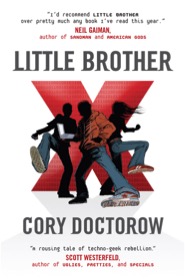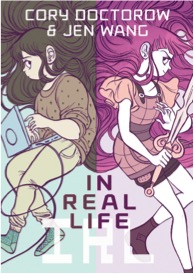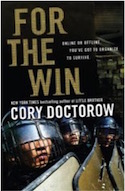by Gina Sipley, Nassau Community College & Hofstra University; & Melinda Smith, Munsey Park Elementary School, Manhasset, NY, & Hofstra University
 The internet provides teenagers with a platform wherein they have innumerable opportunities to voice their beliefs and locate like minded souls. The advent of new media is linked to an increase in social activism and this is seen most closely in the novels of Cory Doctorow. Doctorow’s Little Brother (2008), For The Win (2010) and In Real Life (2014), his graphic novel with Jen Wang, offer visions of not just socially networked teens, but socially conscious ones who use technology as a tool for combatting oppression. In this second July post, we will explore how scenes from these novels mirror the ways that teens are engaged in technologically rooted practices of social activism.
The internet provides teenagers with a platform wherein they have innumerable opportunities to voice their beliefs and locate like minded souls. The advent of new media is linked to an increase in social activism and this is seen most closely in the novels of Cory Doctorow. Doctorow’s Little Brother (2008), For The Win (2010) and In Real Life (2014), his graphic novel with Jen Wang, offer visions of not just socially networked teens, but socially conscious ones who use technology as a tool for combatting oppression. In this second July post, we will explore how scenes from these novels mirror the ways that teens are engaged in technologically rooted practices of social activism.
 The internet is a site for activism; many historically powerless groups, like women and youth, find their voice online (Van De Donk, Loader, Nixon, & Rucht, 2004). In Doctorow’s Little Brother (2008), the protagonist takes an activist stance that seems designed to encourage readers to do the same. Marcus Yallow is a teenager who is thrust unwillingly in the middle of a terrorist plot and the subsequent backlash from the government. Marcus uses his gaming console to connect with other teens who share his skepticism of governmental surveillance tactics. Together they build a communication network within the game to successfully subvert government-imposed maneuvers to diminish civil liberties. This world of game-based communication and real world problem solving is not limited to the imagination of readers of speculative fiction. In Jane McGonigal’s Reality Is Broken (2011) she explores how games can help ordinary people solve some of the world’s most pressing problems, such as the cancer epidemic, the energy crisis, and food insecurity. Online games like Foldit, World Without Oil and Evoke tackle these very challenges and feedback from the players’ experiences offer crucial data to leading scientists. McGonigal (2011) explains that games can bring us together in ways the real world cannot, and Doctorow offers readers a view of one of the many ways that games can be used by teens to facilitate real world collaboration.
The internet is a site for activism; many historically powerless groups, like women and youth, find their voice online (Van De Donk, Loader, Nixon, & Rucht, 2004). In Doctorow’s Little Brother (2008), the protagonist takes an activist stance that seems designed to encourage readers to do the same. Marcus Yallow is a teenager who is thrust unwillingly in the middle of a terrorist plot and the subsequent backlash from the government. Marcus uses his gaming console to connect with other teens who share his skepticism of governmental surveillance tactics. Together they build a communication network within the game to successfully subvert government-imposed maneuvers to diminish civil liberties. This world of game-based communication and real world problem solving is not limited to the imagination of readers of speculative fiction. In Jane McGonigal’s Reality Is Broken (2011) she explores how games can help ordinary people solve some of the world’s most pressing problems, such as the cancer epidemic, the energy crisis, and food insecurity. Online games like Foldit, World Without Oil and Evoke tackle these very challenges and feedback from the players’ experiences offer crucial data to leading scientists. McGonigal (2011) explains that games can bring us together in ways the real world cannot, and Doctorow offers readers a view of one of the many ways that games can be used by teens to facilitate real world collaboration.
 The internet redefines collaboration by empowering cooperation beyond national borders, particularly among young people who would otherwise be unable to meet face-to-face. In Real Life (Doctorow & Wang, 2014) invites the reader to explore the horrors of a globalized economy through the burgeoning friendship of Anda and Raymond, an American teenage girl, and a Chinese teenage boy, who meet one another in possibly the only way they could: while playing an online game. As Doctorow (2014) notes in the novel’s introduction, “it’s the golden age of organizing” (p. viii) and internet games empower players to quickly, and cost effectively, level up to the most difficult part of organizing: strategic action. Raymond is an uninsured factory worker by day and a “gold farmer” by night, laboring over repetitive tasks to secure virtual wealth for more affluent players. The two menial jobs share a peculiar commonality: they result in the production of cheap goods enjoyed by prosperous consumers, mostly in the Western world. As Anda learns of the horrendous labor conditions under which Raymond toils, she uses her knowledge of her father’s union strike to help offer Raymond the support he needs to organize with his co-workers for better labor conditions. This resonates with Boyd’s (2014) research into the socially networked lives of American teens, which finds: “When teens are online, they bring their experiences with them. They make visible their values and attitudes, hopes and prejudices” (Chapter 6, Section 2, para. 11). This cultural diffusion of activist values is salient in the Arab Spring, the Occupy movement, and the Gezi uprising in Istanbul where a globalized movement of young people organized for social change.
The internet redefines collaboration by empowering cooperation beyond national borders, particularly among young people who would otherwise be unable to meet face-to-face. In Real Life (Doctorow & Wang, 2014) invites the reader to explore the horrors of a globalized economy through the burgeoning friendship of Anda and Raymond, an American teenage girl, and a Chinese teenage boy, who meet one another in possibly the only way they could: while playing an online game. As Doctorow (2014) notes in the novel’s introduction, “it’s the golden age of organizing” (p. viii) and internet games empower players to quickly, and cost effectively, level up to the most difficult part of organizing: strategic action. Raymond is an uninsured factory worker by day and a “gold farmer” by night, laboring over repetitive tasks to secure virtual wealth for more affluent players. The two menial jobs share a peculiar commonality: they result in the production of cheap goods enjoyed by prosperous consumers, mostly in the Western world. As Anda learns of the horrendous labor conditions under which Raymond toils, she uses her knowledge of her father’s union strike to help offer Raymond the support he needs to organize with his co-workers for better labor conditions. This resonates with Boyd’s (2014) research into the socially networked lives of American teens, which finds: “When teens are online, they bring their experiences with them. They make visible their values and attitudes, hopes and prejudices” (Chapter 6, Section 2, para. 11). This cultural diffusion of activist values is salient in the Arab Spring, the Occupy movement, and the Gezi uprising in Istanbul where a globalized movement of young people organized for social change.
 In For the Win (2010), which also much more exhaustively (and exhaustingly) explores the exploitation of gold farmers in China and India, Doctorow’s characters are from across the globe and from different backgrounds. They band together to become internet activists and use every means of communication available to them—MMORPGS, tweeting, blogging, posting, direct messaging, auto-translators, and a now ubiquitous knowledge of English, to unionize as the IWOWWW (International Workers of the World Wide Web), or “webblies,” to protect and preserve those of the 99% who eke out an existence online. As one of Doctorow’s earlier texts, the balance between narrative and lecture is not quite fluid and the text can at times feel overly didactic, although his fans never seem to mind.
In For the Win (2010), which also much more exhaustively (and exhaustingly) explores the exploitation of gold farmers in China and India, Doctorow’s characters are from across the globe and from different backgrounds. They band together to become internet activists and use every means of communication available to them—MMORPGS, tweeting, blogging, posting, direct messaging, auto-translators, and a now ubiquitous knowledge of English, to unionize as the IWOWWW (International Workers of the World Wide Web), or “webblies,” to protect and preserve those of the 99% who eke out an existence online. As one of Doctorow’s earlier texts, the balance between narrative and lecture is not quite fluid and the text can at times feel overly didactic, although his fans never seem to mind.
But Doctorow’s struggle to strike a balance between literary elements, such as deeply drawn characters, and impassioned rhetoric, renders an important lesson for writers, parents, teachers, school administrators and other guardians of adolescence: authentic change usually emerges from the base, rather than the superstructure. Teens are motivated to social action when they can empathize with the plight of others and this empathy emerges from friendships forged online (Manrodt, 2014). Some of the activist plot lines in this book feel a bit too far-fetched or overly optimistic on the part of Doctorow, which solidifies the importance of narrative based storytelling as a way to perhaps inspire, rather than to demand action. Still, Doctorow’s books stand apart in their expectations of and respect for, the young, and seem to ask the rest of us to reconsider time kids spend online, and the tools and skills they bring to their use of technology. The next revolution won’t be televised; it will be global, intergenerational, and organized online.
References
Boyd, D. (2014). It’s complicated: The social lives of networked teens [Kindle version]. Retrieved from amazon.com
Manrodt, A. (2014, April 8). The new face of teen activism. Teen Vogue. Retrieved from http://www.teenvogue.com/story/teen-online-activism
McGonigal, J. (2011). Reality is broken: Why games make us better and how they can change the world. New York: Penguin Press.
Van De Donk, W., Loader, B. D., Nixon, P. G., & Rucht, D. (Eds.). (2004). Cyberprotest: New media, citizens and social movements. New York: Routledge.
Journey through Worlds of Words during our open reading hours: Monday-Friday, 9 a.m. to 5 p.m. and Saturday, 9 a.m. to 1 p.m. To view our complete offerings of WOW Currents, please visit archival stream.
- Themes: Gina Sipley, Melinda Smith
- Descriptors: Books & Resources, WOW Currents
